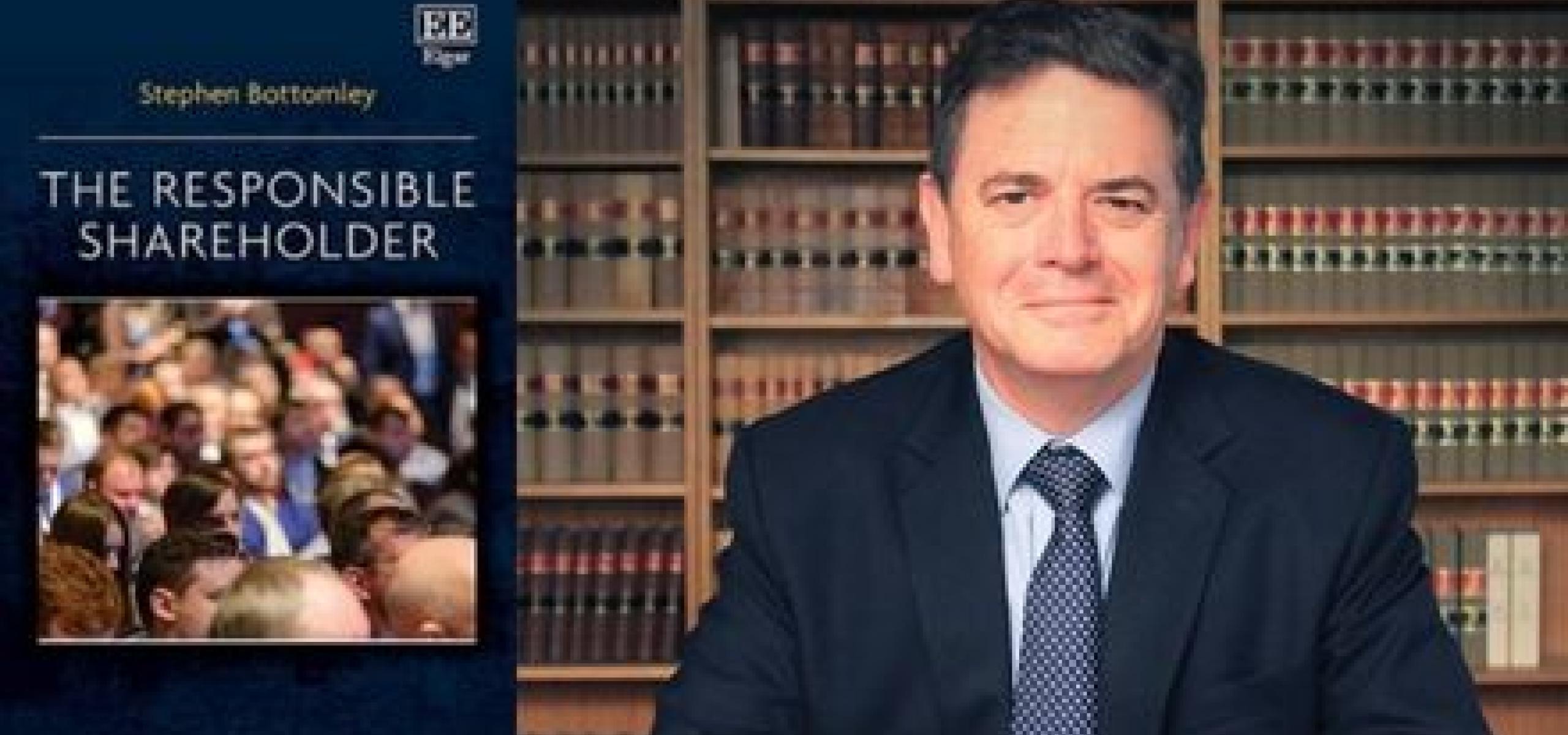
In his new book, Emeritus Professor Stephen Bottomley FAAL explores shareholders' privileged position within the corporate law system.
I argue in the book that shareholders should think of themselves, and be thought of by others, as having a moral, and possibly even a legal, responsibility for the actions of the companies from which they derive financial benefit.
When companies cause harm to the environment, inflict injury on workers, or commit financial fraud, we're used to seeing directors, managers, advisers or regulators come under scrutiny. By contrast, shareholders have been relatively safe from criticism or condemnation in the eyes of the law and conventional morality.
Are shareholders passive agents whose interests start and end with dividends, or do they have a responsibility to drive ‘principled profit’ in the context of environmental, social and governance (ESG) issues?
It’s a question explored in a new book by Emeritus Professor Stephen Bottomley FAAL, who recommends that it is time to hold this key constituency in the company decision-making structure accountable.
Comparative and interdisciplinary, The Responsible Shareholder(Edward Elgar, 2021) is a key resource for students and scholars of corporate law and governance, business law and insolvency law. It is also valuable reading for company law policymakers, corporate interest groups and think tanks engaged in corporate law reform.
In this Q&A, Professor Bottomley outlines the background of his book and why shareholders should demand a greater say in the conduct of companies in which they have invested.
What does it mean to be a ‘responsible shareholder’ in the context of our corporate law system?
I argue in the book that shareholders should think of themselves, and be thought of by others, as having a moral, and possibly even a legal, responsibility for the actions of the companies from which they derive financial benefit. Shareholders are members of the company, not simply customers or clients. Of course, not all shareholders are equally placed to do something about this, but that does not detract from the underlying proposition (which goes back many decades): in the absence of valid excuses, those who gain from actions should bear responsibility for the consequences of those actions.
What inspired this book and can you describe the research process?
The original impetus was the James Hardie asbestos saga which began in the 1960s, but came to a head about 40 years later when the board of the parent company decided to restructure the business to insulate the liability for asbestos injuries from the rest of the business, and then left an under-funded company to deal with this. As I describe in the book, directors and managers rightly came in for criticism. But not the shareholders – in whose name and for whose benefit the restructuring had taken place. It simply struck me as morally wrong.
The research process was long and drawn out, interrupted by the five years of deanship. The upside to that is I had plenty of time to think and refine my ideas.
What barriers have traditionally prevented shareholders from being held to higher moral and legal standards?
There are legal and practical barriers. The law sends confusing signals to shareholders. On the one hand, they are given voting rights, access to AGMs, etc. On the other, they are encouraged to be passive, to go along with management proposals. Indeed, the law specifically denies shareholders the right to put advisory resolutions at a meeting (that is, a resolution that indicates issues or concerns which the board should consider).
Does the book address any current events, debates or academic controversies?
There are many instances where, potentially, shareholder pressure and engagement could have an impact on corporate actions. The destruction of the Juukan Gorge sacred site by Rio Tinto is a recent example. More generally, there is a growing concern, academically and in business, about ESG issues which, in turn, is re-invigorating a long-standing debate about the purpose of the corporation (something that Professor Peta Spender FAAL and Dr Michelle Worthington are working on).
To be fair, many shareholders (including some powerful institutional shareholders) are now demanding more of the companies in which they invest, but my sense is that this is still the exception to the norm.
Does the book relate to any other projects you are working on, either solo or with ANU or international colleagues?
The book actually draws an end to a much longer project of mine, the first instalment of which was my earlier book The Constitutional Corporation: Rethinking Corporate Governance (Routledge, 2007).
What do you hope readers will gain from the book?
A good night’s sleep. OK, switching back to serious mode: I suspect that the book will produce polarised responses. Some will insist that the argument is impractical and even harmful to a healthy investment market. They may be right. Others will accept the moral argument, even though they may differ on the implications and outcomes. My purpose is to spark that debate. Are we happy with a corporate law system that marginalises shareholders from corporate actions, treating them as innocent bystanders? If so, should we not at least be honest about that, and amend the law accordingly. Or, as I hope, we could take the idea of shareholder membership more seriously.
Purchase your copy of The Responsible Shareholder here.